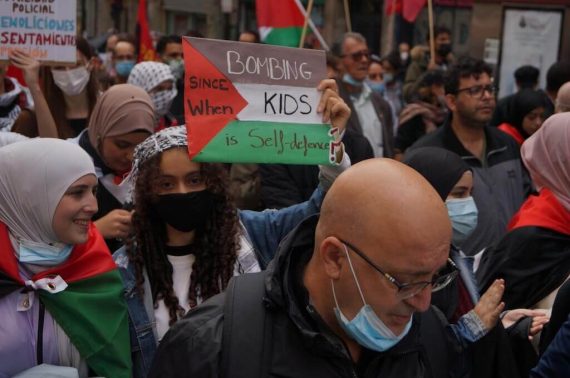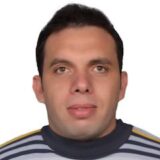All indications suggest that since May 2021 the Israeli authorities have made Palestinians living in Israel their next target. The Israelis have always targeted Palestinians in Israel and elsewhere using different methods such as arrests and house demolitions; however, the May 2021 escalation has triggered a novel process in which all Palestinians in the West Bank, Gaza Strip, and Israel, started to act as one body, shattering Israel’s divisive narrative of Gazans, West Bankers, and Arab Israelis. For a real moment, they have all become Palestinians.
Israeli authorities target Palestinians in Israel by isolating them from their fellow Palestinian living in the Gaza Strip, the West Bank, and the diaspora. An increasing number of incidents reveal that Israel views any connection that the Palestinians in Israel have with other Palestinians, be this cultural, political, or economic, as a threat to its existence, a discourse deeply rooted in the settler-colonialist mindset. This Israeli campaign of isolating Palestinians has previously pushed Palestinians to take to social media under the hashtag #Mutawasiloun, expressing their right to be connected to each other.
This logic aims to keep Palestinians divided and explains why Israel isolates the Gaza Strip from the rest of Palestine. No doubt, there is a political Palestinian division, but the Israeli geographical division has greatly contributed to it. What is more, this political division has to do with post-Oslo politics and does not include much of the Palestinian diaspora.
Israel has for long maintained a policy that deals with Gaza as a separate entity and Palestinians residing there have received harsher treatments even though following the Oslo Accords of 1993, they carry the same ID cards that were given to Palestinians in the West Bank. As of now, Israel continues to have the upper hand in issuing these Palestinian ID cards.
The case of Palestinian PhD student Somaya Falah, who is enrolled in the Faculty of Civil and Environmental Engineering at the Technion-Israel Institute of Technology in Haifa, speaks of this reality. Falah’s activism and writings expose Israel’s destruction of the Palestinian environment, and the environmental hazards the Israeli occupation causes to the environment. Falah was interrogated on January 27, 2022, and placed under house arrest for 10 days for taking part in a Palestinian diaspora conference in Spain in November 2021 known as Masar Badil, Palestinian Alternative Revolutionary Path Movement, during which the Israeli authorities claimed she spoke to Khaled Barakat, a Palestinian writer and a political activist who resides in Canada.
“The Israeli oppression is mounting after our people have risen in May 2021, and there is an intention to ‘teach them a lesson.’ Palestinians are used to this experience,” Barakat, a native of Jerusalem, told Politics Today in an exclusive interview, the first since Falah’s arrest.
“The reason my name is mentioned is for Israel to attempt to hide the real story, which is the attack on Palestinian students and the right of return. These were the discussions at the conference that upset the Israelis. Obviously, I attended the conference in Madrid as I was one of the organizers, and I saw every person who attended the conference. This was a legitimate, public event that people from five continents attended,” said Barakat.
According to the Israeli authorities, Falah discussed the Palestinian student movement in Israel with other Palestinians in the diaspora including Barakat. In October 2021, the Israeli authorities classified six Palestinian NGOs as terrorist, including Addameer Prisoner Support and Human Rights Association, and the Defense for Children International – Palestine (DCIP), which campaign for the rights of Palestinian prisoners.
According to Israeli law, Falah’s speaking to Barakat is prohibited because it is viewed as contacting “a foreign agent.” According to this Israeli logic, a foreign agent could be a political activist, a human rights defender, a student, a relative, or simply any Palestinian who might dare to call for equal rights for the Palestinians after Israel has clearly refused to grant them a state as stressed once again by Israel’s current Prime Minister Naftali Bennet. Bennet said it would be “a terrible mistake to create a Palestinian diplomatic entity in our land.” Bennet noted that Yair Lapid and Benny Gantz, who he described as left-wing politicians in his cabinet, can continue supporting establishing a Palestinian state but his “camp” does not.
Recommended
“The real Israeli intention here is to target the Palestinian student movement. They do not like the communication that is happening, in general, between Palestinians inside Palestine and Palestinians in the diaspora. They deliberately choose the term ‘foreign agent’ in order to say that there are no Palestinian refugees or Palestinians who have been displaced and uprooted from their land. This shows that Israel is a failed settler colonial project, and all of these lies about a ‘Jewish and democratic state’ are exposed in reality on a daily basis of our people since 1948 in occupied Palestine and the oppression and systematically racist policies they confront on a daily basis,” Barakat added, speaking to Politics Today.
Bennet described Bedouin protests against Israeli plans to confiscate Palestinian-owned lands in the Negev – where Falah actively researches and where many refugees in Gaza come from – so as the Jewish National Fund (JNF) can plant trees as “pockets of lawlessness,” adding that “there are laws, and they can bring in as many police as they need to – trees will be planted, and after that, I’m willing to talk with everyone.”
During a nationwide protest held recently before the headquarters of the Israeli government in Jerusalem, Aden Al-Hajouj, an activist from the Negev who became known during the most recent protests, told Bennet, “We are not scared. Our momentum is stronger than ever. Our resistance is stronger than ever. You could put all of us in prison, you could demolish all of our homes, but we are not scared. I am a girl of Negev, I was born and raised here, what I have to tell you is ‘go back to San Francisco, Bennet.’”
Falah’s research, which also exposes and challenges the Zionist narrative of “making the desert bloom,” reveals why she has been targeted by Israel. In fact, planting trees that are foreign to the land does not make it bloom, but instead it destroys the ecosystem, and Falah’s exposure of these truths have made the propagators of Israel’s mainstream narrative feel threatened. Meanwhile, Technion-Israel Institute of Technology, where Falah studies, has chosen to be silent after one of its students was placed under house arrest and is being interrogated for expressing her national identity.
The case of Falah is not the first of its kind. Muhannad Abu Ghosh, a Palestinian from Jerusalem who resides in Haifa and who is known for his political writings critical of both Israel and the Palestinian Authority, was arrested for “contacting foreign persons and agents.” Majd and Ward Kayyal, two siblings from Haifa, were arrested in December 2020, against the backdrop of the same allegations. Palestinians, according to this Israeli logic, are “foreign agents,” and their communication is, therefore, criminalized.
“This is coming because our people have raised their voices against colonization, racism, and apartheid. The campaign in solidarity with Somaya Falah and others who have faced and are facing similar forms of repression will continue as long as Israel practices systemic racism and colonialism with impunity,” concludes Barakat.
Israel’s view of Palestinians as foreign is a continuation of its denial of the Nakba and Palestinian existence, and part of its claims that the history of this land only started with the creation of Israel. Palestinians, such as Falah and Al-Hajouj, and their work on the ground challenges this narrative and as a result, Israel seeks to silence their voices.
The same Israel that calls itself the only democracy in the Middle East grows impatient of Palestinians, who in theory are Israeli nationals, for simply reminding it of its recent past. Today, the only incontestable truth is that Palestinians like Somaya Falah and Aden Al-Hajouj, and the trees that their ancestors planted on this land are a robust remaining native that reminds Israel of what on February 1, 2022, Amnesty called an apartheid.

VIDEO: Nakba Survivors Speak: “The sky was our blanket and the ground was our mattress”





